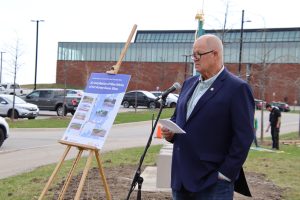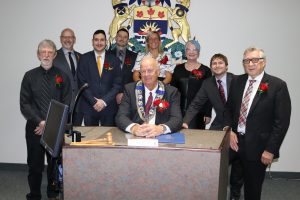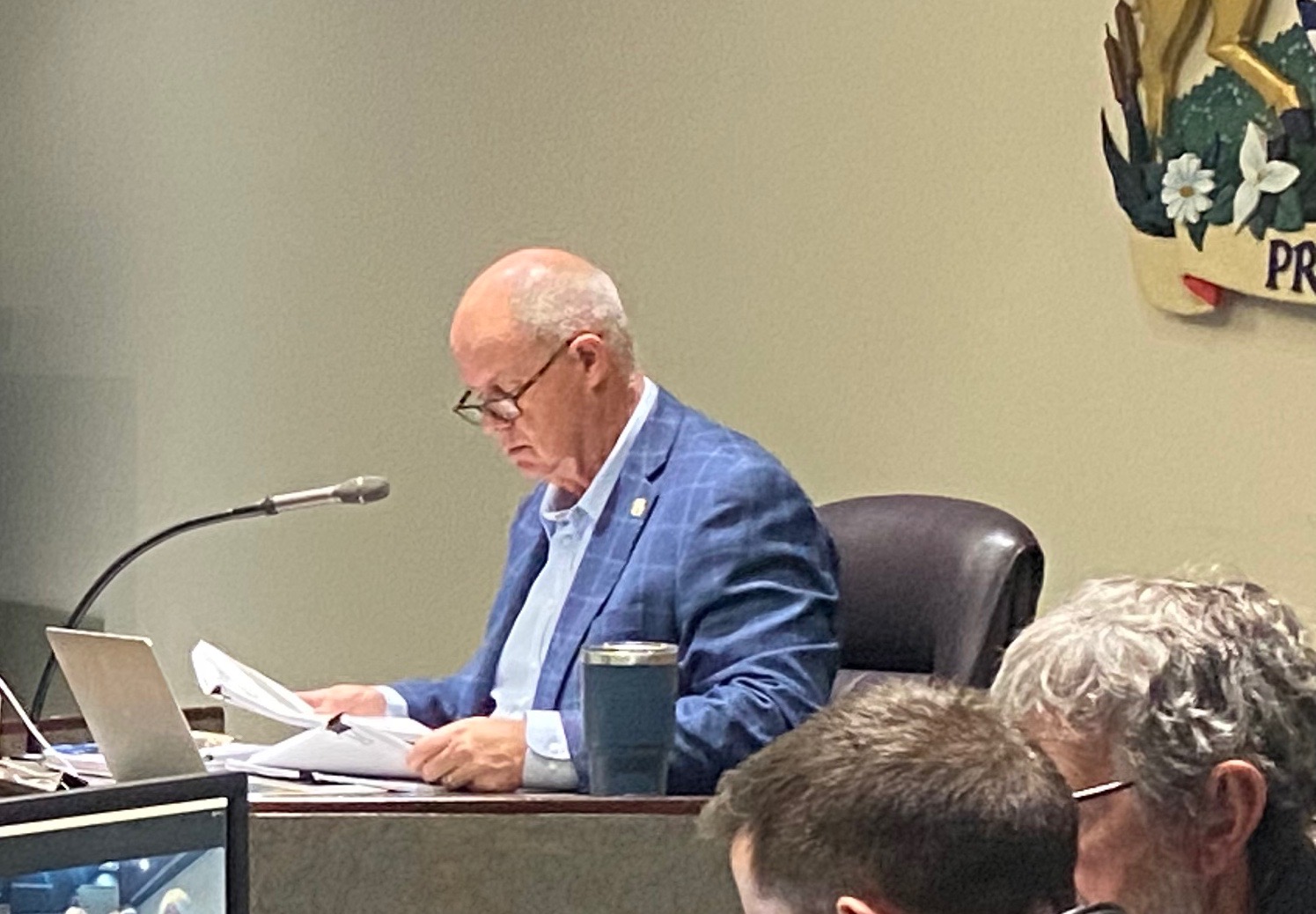Don McIsaac, Mayor of Orillia, recently set aside time to meet with Sustainable Orillia (SO)to talk about sustainability—short and long-term—across our community. It was an opportunity for him to reflect on the past year and to share his perspective on how we are doing as a community and, as well, how SO is doing as an organization on our shared path to a sustainable future.
The Mayor kicked off the discussion with an overview of some of the longer-term challenges and opportunities for Orillia, including future growth and the potential expansion of the city. Short to mid-term, Mayor McIsaac sees continuing growth and believes there is capacity to accommodate that growth within our existing boundaries. He pointed to a number of infill opportunities across the city, but cautioned that, as Orillia grows, at some point there will be a need to expand the city’s boundaries. This longer-term challenge will likely be referenced as part of Orillia’s Official Plan Review—currently underway. Growth is a challenge that Orillia shares with many of our sister communities across the province.
 Looking back on his first full year in office, Mayor McIsaac feels good progress has been made on a number of fronts; however, he strongly emphasized the need to take more action and to take it further. Key among the measures implemented by the City in 2023 was the establishment and staffing of a Climate Action Co-ordinator position for a person now responsible for shepherding Orillia’s Climate Future–-an investment in keeping our community climate change action plan front and centre as the tough work of implementing the plan’s recommendations begin.
Looking back on his first full year in office, Mayor McIsaac feels good progress has been made on a number of fronts; however, he strongly emphasized the need to take more action and to take it further. Key among the measures implemented by the City in 2023 was the establishment and staffing of a Climate Action Co-ordinator position for a person now responsible for shepherding Orillia’s Climate Future–-an investment in keeping our community climate change action plan front and centre as the tough work of implementing the plan’s recommendations begin.
A series of Greenhouse Gas audits was also completed across the city’s stock of twelve buildings this past year. Funded in part with grants from the Federation of Canadian Municipalities, these audits identified where, and how much, retrofitting will be needed to reduce carbon emissions from these buildings. These audits directly support Big Move #3 – Housing – in Orillia’s Climate Future. Additionally, a second light-duty electric vehicle was added to the city’s fleet, plus another charging station. These initiatives will help reduce emissions, while additional water-filling stations installed around the city are removing more and more plastic bottles from our eco-system.
The Mayor also referenced the significant benefits realized from the ‘Clear Garbage Bag Program’ that was introduced in February, 2022. During its first full year, there was a reduction of close to 40% in household waste picked up at the curb—with some concurrent but modest increases in both recyclables and organics. The strength of these results (which continue to track positively into Year 2 of the program) ultimately support a longer lifespan for the city’s Waste Diversion site at 100 Kitchener Street. Equally important to Mayor McIsaac, this success reflects greater widespread efforts by Orillia citizens to reduce their garbage. In this regard, the Mayor and his family ‘walk the talk’—guided by his wife, Cindi, on ‘what goes where.’ The priorities of waste reduction and diversion are top-of-mind in the McIsaac household.
As mayor, McIsaac brings a longer-term view to how Orillia’s waste management and reduction may look in the future. He would like to see incentives for those households that are reducing their waste and is looking at ways the city can allocate collection tags to help make that happen. He is also interested in how waste is being effectively and sustainably disposed of in other parts of the world—in particular, where incineration has been successfully and cleanly implemented in a number of European locales. Does that have a future application for Orillia? is a question he feels is worth exploring.
Last year, as part of a similar discussion, the Mayor identified three priorities for Sustainable Orillia’s (SO) consideration:
 Ensuring that City Council is kept informed on sustainable issues was and continues to be a top priority. As Council makes decisions that affect us now and into the future, Mayor McIsaac believes an informed exploration of sustainability impacts is essential. He looks to Sustainable Orillia as one of the key community resources to ensure that such exploration happens. Sustainable Orillia deputations to Council—such as the recent presentation on ‘Alternative Energy Sources’—provide good examples of how SO research can inform and add value in support of our climate action plan, Orillia’s Climate Future.
Ensuring that City Council is kept informed on sustainable issues was and continues to be a top priority. As Council makes decisions that affect us now and into the future, Mayor McIsaac believes an informed exploration of sustainability impacts is essential. He looks to Sustainable Orillia as one of the key community resources to ensure that such exploration happens. Sustainable Orillia deputations to Council—such as the recent presentation on ‘Alternative Energy Sources’—provide good examples of how SO research can inform and add value in support of our climate action plan, Orillia’s Climate Future.
The ability to engage young people and to provide them with practical, local knowledge on sustainable issues is another ongoing priority for Mayor McIsaac—as it is for Sustainable Orillia. Perhaps understandably, this comes with challenges, as connecting with in-class or after-school programs within public schools is not easy in the wake of the pandemic. Finding available venues and platforms, including social media, and leveraging them to reach and support younger people with our community-based sustainable message will continue to be a priority for SO—a priority that is greatly helped by the work of our Sustainable Orillia Youth Council.
The Mayor’s third priority, as was the case last year, is action—to ‘Just do it.’ Our Mayor has a strong ‘action orientation’ and is always exploring ways to get things done. Drawing on his experience over this past year, Mayor McIsaac shared several interesting examples of where ‘simple things can be difficult and seemingly hard things can be easy.’ He encouraged all of us, and SO in particular, to keep sourcing opportunities to ‘just do it’—to spread the word and move forward.
It is our pleasure to report that our Mayor continues to be a strong advocate for sustainable actions across our community. Many thanks, Mayor McIsaac, for once again sharing your time and thoughts with Sustainable Orillia and for your continuing support and leadership on our shared journey to reduce emissions and ensure long-term sustainability – right here in Orillia.

